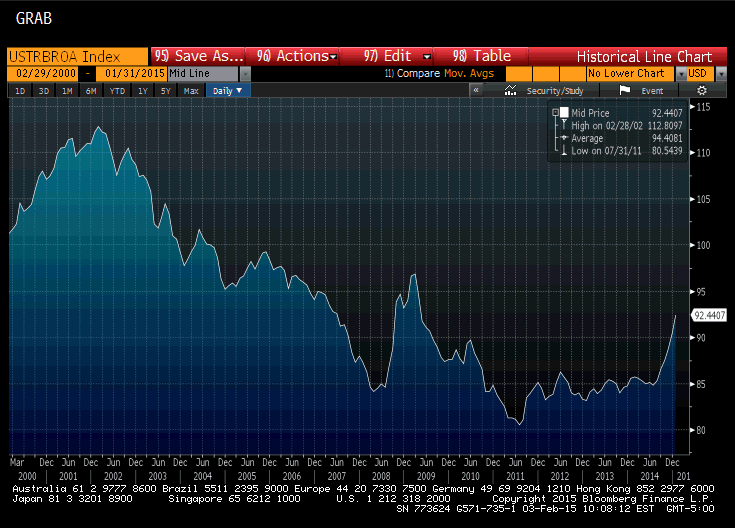The Federal Reserve's broad trade-weighted measure dollar rose 2.1% in January. It is now a little less than 15% above the record low set in July 2011. The chart here shows this measure of the dollar since 2000.

In January, as the (real) trade-weighted dollar rose, U.S. 10-Year yields fell 50 bp and oil prices fell by 10%. Surely, the decline in US yields and oil more than offset the economic impact of the dollar's rise.
In Monday's Financial Times, Edward Luce recapitulates many arguments that are circulating among investors. Although he recognizes that what is happening is not a 1930s-style beggar-thy-neighbor competitive currency devaluation, he warns of the "undertows" and the "perils" of a strong US dollar.
Expressing the concern of many equity investors, Luce argues that the dollar's rise is having a "strong effect on corporations' bottom line". This has been repeated so often that it must be true. But it is not. A report cited by MNI found that "58% of companies with high overseas exposure have beaten on EPS vs. 46% of the pure domestics. MNI also notes the ISM's January report on manufacturers, though there was no concern expressed about the rising dollar (there was concern about falling oil prices).
Luce cites several companies that did cite the stronger dollar as a negative factor. What happened to journalistic skepticism? He simply repeats what the corporate officials have said. Isn't that the job of a corporate flak? We need journalists to question public- and private-sector officials. Some like Alcoa (NYSE:AA) and L'Oreal (PARIS:OREP) cited the currency developments as positive. Not only does Luce abdicate his journalistic responsibilities, but he stacks his deck.
He warns that a weak dollar is encouraging consumption over investment. It is true that personal consumption rose 4.3% at an annualized rate in Q4 '14. It was the strongest increase since Q1 '06. There is one significant difference between this consumption and pre-crisis consumption. Current consumption is being financed without the use of revolving credit (credit cards). There is a general misconception that investment can or should lead the recovery. This has not happened since before the Great Depression. It is not for a lack of funds, as US corporates have an estimated $2 trillion in cash. Look at what Apple (NASDAQ:AAPL) is doing. It will again issue debt to fund its dividend- and stock-buying programs, leaving its cash pile intact.
Luce worries about US exports stalling. US exports rose 6% from February 2014 through August to a record, just shy of $200 bln. They have indeed stalled, as Luce assumes but does not prove that it is due to the rise of the dollar. A more statistically robust argument would cite the stagnation of the eurozone economy, the contraction in Japan and the slowing of China. A labor dispute in the West Coast may also impact US trade figures.
There could be, as Luce points out, a threat of a political backlash. However, insisting on injecting a clause about currency market manipulation in the trade agreements (TPP and TTIP) is hardly an example of protectionism. The US Treasury has been charged with identifying currency manipulation and has failed to cite a single country for more than a decade.
The dollar's rise, which we insist is still likely in the early days, is a lot of things, but perilous is not one of them.
